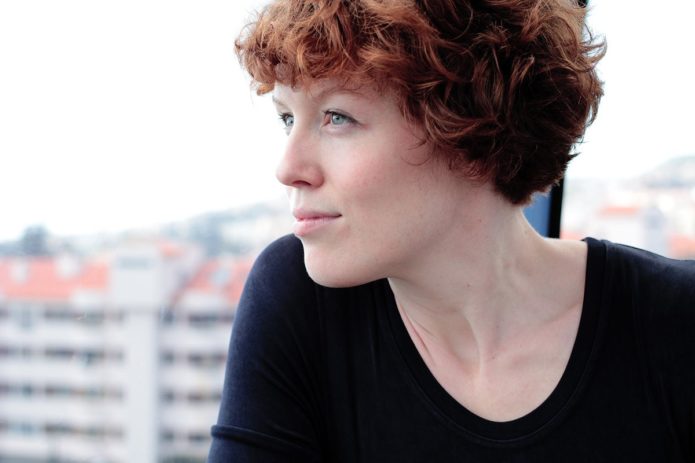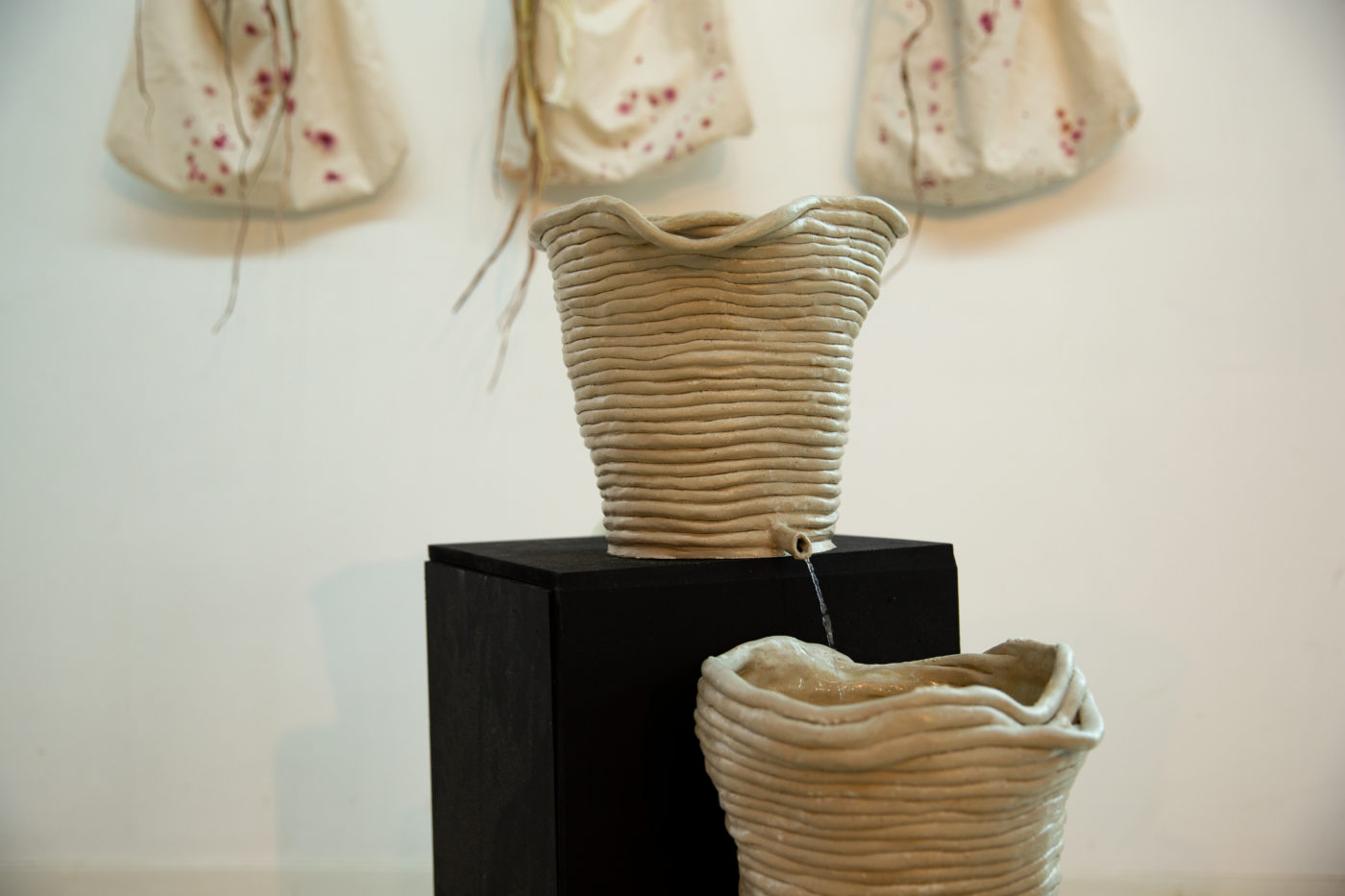 Sissel Marie Tonn, 'Water-thieves and Time-givers' (2019), photo Maarten Van Haaff / Framer Framed
Sissel Marie Tonn, 'Water-thieves and Time-givers' (2019), photo Maarten Van Haaff / Framer Framed Report: Plastic Hypersea Reading Rooms
When Framer Framed, along with the rest of the world, shifted to social distancing and online working as a result of the COVID-19 lockdown, we were faced with a dilemma. As an organisation based on presentation and connection, mainly through physical gatherings in our exhibition space, how might we be able to still connect to the public?
by Ashley Maum
June 2020
As we thought back to ways we had engaged meaningfully with individuals before, the question remained whether these interactions could be translated to an online environment, when they have been so dependent on the intimacy of a social gathering.
Given the new conditions many found themselves in— locked in at home, with plenty of time— we specifically turned to the idea of reading rooms, wherein we invite participants to read a selection of texts beforehand to discuss them together, guided by moderators. Framer Framed first hosted two in-person reading rooms, initiated and moderated by Sissel Marie Tonn, during the exhibition Elsewheres Within Here (2019). Tonn often focuses her practice on the ways in which individuals are entangled with their environments and the idea of where we perceive our own bodies to end. In the context of the COVID crisis, she became especially interested in how the virus challenges our sense of embodiment— to the extent that we become aware of our own porosity. We are not discrete entities, but rather co-contaminating, leaky, and vulnerable to and in the surrounding environment we co-create. At Framer Framed’s invitation, Tonn proposed the Plastic Hypersea reading room, beginning with a cluster of two sessions. [1]
For both sessions Tonn, was joined by a guest reader / co-moderator: Dani Admiss and Alexis Shotwell, respectively. The sessions were hosted online via Zoom meetings, and we were happy to see participants join from several cities in the Netherlands, as well as other countries. We came together with individuals based in France, Canada, the UK, Denmark, Sweden, Taiwan, and Spain. While social distancing and moving online could pose limitations, we were instead able to expand our conversation and audience beyond the fixed geography of Framer Framed in Amsterdam.
We found that individuals were eager to discuss the current situation and how the texts could be related. The participants were excited to share experiences and resources (books, podcasts, lectures) that the readings had reminded them of. In all, it was moving to watch a digitally dispersed group engage together with something we held differently yet still in common.
The following account of the two sessions is written from a more personal perspective to give an understanding of their participatory nature.
SESSION 1 | 24 April | Guest reader: Dani Admiss
Texts: Excerpts from Against Purity: Living Ethically in Compromised Times (2016) by Alexis Shotwell
Washing my hands for 20 seconds. Dani has asked us to do this as a sort of meditative activity in between discussion. Admittedly, I did not used to be so diligent with this form of cleansing. But now, washing my hands has urgency, as a form of self-care and protection from a lurking virus. Before the reading room session, I jotted down notes in the margins of Shotwell’s text. I kept noticing how the ink from my pen got onto my hands. The more I thought, learned, read, the more the ink seeped onto my skin.
Shotwell pulls at the curtain of supposed purity, revealing that there was no fall from grace, no clean slate. And there is no chance to rid ourselves of toxicity, it is within and without— even present in the ‘all natural’ and still chemically-infused soap I now spread across my hands to combat my accumulated toxins.
Ingredients:
Water, Sodium laureth sulfaat, Glycerine, Sodium chloride, Sapindus mukorossi, Caprylyl/Capryl glucoside, Melkzuur, Parfum (bevat: Linalool en Limonene), Kaliumhydroxide.
I’m not sure what these molecules are, and I don’t really feel inclined to inquire after them. I just like the smell (eucalyptus & rosemary).
We were always toxic, so let’s begin from there. We were always complicit, so let’s begin.
So then, where are we now, and what has become important? I would like to see differently, critically. To recognise the rhetoric of purity in capitalist circulation— the advertisement for a detoxing pill, tea, yoga lesson, commodity. We are now enticed to buy our way out of toxicity.
And here we come to the most critical part of our discussion— who can afford the charcoal toothpaste, the water filter, the detox. Who can afford purity? As a few filter out their toxicity, others see it compound. Because toxicity cannot disappear, it can only be displaced. So, I begin to pay attention to how toxicity is differentially placed upon certain bodies physically, socially, and ideologically. I begin to take note of an unavoidably toxic ecological system.
I constitute and move within it.
SESSION 2 | 8 May | Guest reader: Alexis Shotwell
Texts: Excerpts from Brilliant Imperfection: Grappling with Cure (2017) by Eli Clare and Animacies: Biopolitics, Racial Mattering, and Queer Affect (2012) by Mel Y. Chen
Alexis asks us to think about what we are grappling with. Eli Clare has introduced us to this concept as he writes on disability and cure. Clare grapples with cure in that he refuses it for his own disabled body, but he realises he cannot wholly deny it for others. For a friend suffering from cancer: what does cure mean for her?
We take a break from group discussion for a few minutes. Alexis invites us to hold a part of ourselves that we are grappling with. Before moving away from the screen, she reminds us to do this with care, to know ourselves and what we can bear without re-traumatising.
I grapple with my own complicity, harm caused and felt that I empathise with and agonise for but see no path to stop. But, as Alexis cautioned, some of the places I feel grappling most viscerally are held in parts of self and memory.
Refusal without denial.
In this second session, we have talked more in smaller groups— finding our own ways into the text. My group is now talking about the concept of a digital detox. I am picturing my own toxic, digital interdependencies and how they cross over into intimacy. My computer resting on my lap for hours of the day before I eventually carry it to bed with me. My phone stretching between all my distanced relationships.
Mel Chen discusses their own disability and its capacity for debilitation. As they retreat into themselves, their perception of animacy begins to change. Chen describes confusing the touch and quality time of their partner with their couch. During the reading room, we ask each other who and what is granted animacy / personhood, what modes of attention are more socially valued?
I think about quarantine and how it has altered my own animate relationships. I’ve certainly touched, held, and given attention more to the still objects in my home than to people in the past months. Has the virus made these anti-social relationships more socially acceptable? I’m not meeting with friends, so I might as well join my couch for a drink.
Receding, ceding inward.
- [1] The title of the reading rooms refers to the concept by Mark and Dianna McMenamin called the “hypersea”, which is the vast mass of living cells interconnected across bodies and environments through water. This inner ocean is increasingly becoming polluted by microplastic particles, but the title also refers to plasticity as it is used in neuroscience (i.e. the ability of the brain reorganise, to change structurally).
Ecologie /
Agenda
Reading Room: Plastic Hypersea
Reading Room over hedendaagse kunst en ecologisch bewustzijn
Reading Room: Plastic Hypersea
Leesgroep over hedendaagse kunst en ecologisch bewustzijn
Netwerk
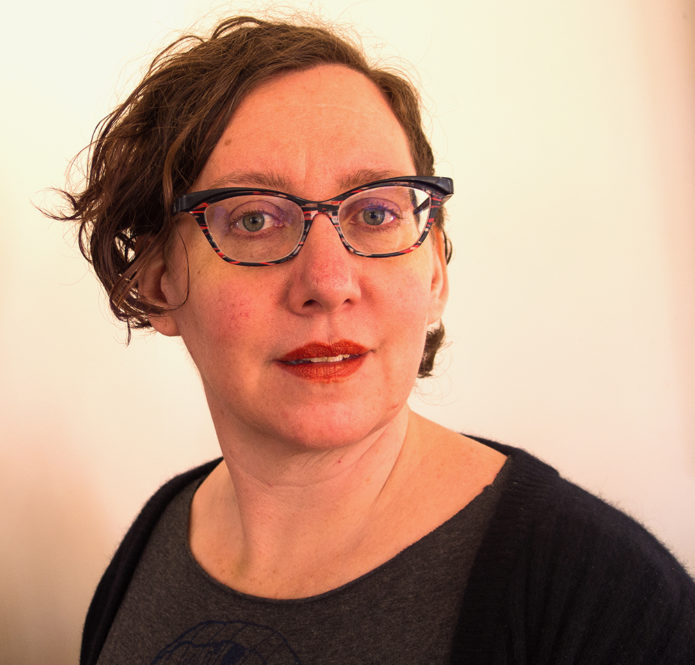
Alexis Shotwell
Schrijver, onderzoeker
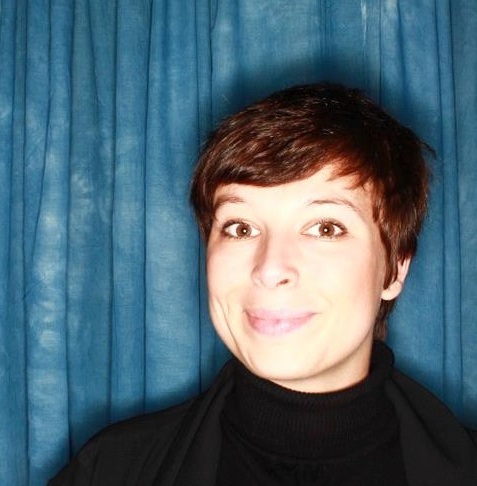
Danielle-Maria Admiss
Curator, Onderzoeker
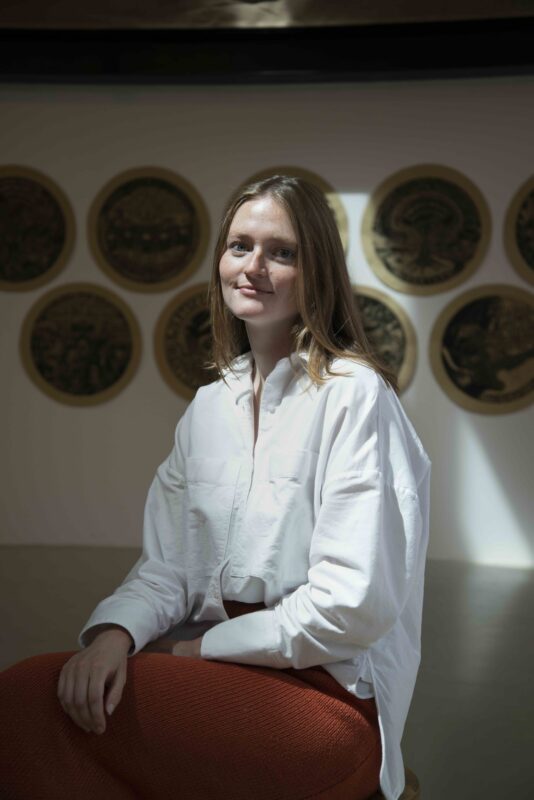
Ashley Maum
Exhibitions and research
